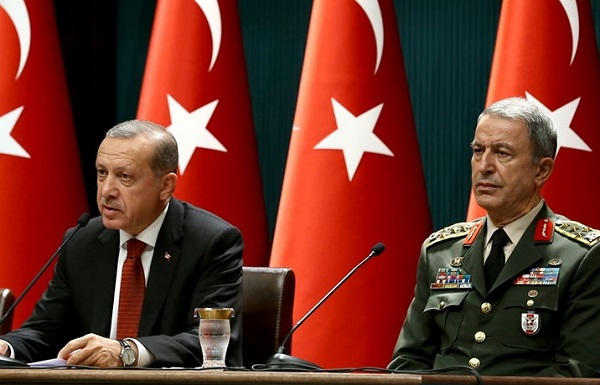After Mr. Erdogan's threats, Israel asks NATO to exclude Türkiye

On July 28, Turkish President Recep Tayyip Erdogan threatened Israel with military intervention, recalling Turkey’s support for the Libyan Government of National Accord and Azerbaijan by mobilizing mercenaries recruited from Syrian armed groups lined up in Ankara’s positions.
President Macron strongly condemned this modus operandi in October 2020. While it was established that Turkey had sent Syrian mercenaries to support the recent Azerbaijani offensive to retake Nagorno-Karabakh, he called on “all NATO partners to simply look at the face of what is the behaviour of a NATO member.”
Following the statements made by Mr. Erdogan, Israel stands on the same line. “In light of the threats made by the Turkish President […] To invade Israel and its dangerous rhetoric, Foreign Minister Israel Katz asked diplomats […] In a press statement, Israeli diplomacy indicated the need to urgently deal with all NATO members and call for condemning Turkey and demanding its expulsion from the regional alliance.
This is not the first time Turkey’s standing within NATO has been called into question. Following the purges launched by the Turkish government in the wake of the failed coup in July 2016, then-US Secretary of State John Kerry sent a warning to Mr Erdogan.
“NATO also has requirements regarding democracies. Many people have been arrested, and they have been arrested very quickly. It is clear that the level of vigilance and monitoring will be high in the coming days. I hope that we can work constructively and avoid taking a step back,” he added.
The Foreign Ministry spokesman then noted that “democratic responsibilities” go “hand in hand with membership” in international institutions such as the European Union. [UE] And NATO. But with Turkey occupying a strategic position to ensure control of access to the Black Sea, things remained the same.
However, Ankara has continued to attract grievances from some NATO members. Its decision to purchase the S-400 Triumph air defense systems from Russia led to its exclusion from the F-35A fighter-bomber program by the Trump administration. Then its military operations against the Syrian Democratic Forces [FDS, à majorité kurde] While they were on the front lines against ISIS [EI ou Daesh] It has strengthened its criticism of it, as well as its territorial claims in the Eastern Mediterranean, accompanied by intimidation against Greece and the Republic of Cyprus.
In 2020, former President Hollande considered that Turkey's “aggressive behavior” raised the question of “its presence in NATO”. Especially since a few weeks earlier, a Turkish ship had illuminated the Lafayette-class frigate “Courbet” with its fire control radar… The former tenant of the Elysée was not the only one to be “questioned”. Before him, elected representatives in the US Congress, such as Democratic Representative Eric Swalwell, had affirmed that Turkey's exclusion from NATO should be “on the table”.
However, both sides can always question Turkey's accession to NATO… and that will not change anything because NATO, unlike other international organizations, has no mechanism to exclude one of its members.
In fact, the Treaty only mentions the departure of a member state in Article 13.
“After the Treaty has been in force for twenty years, any Party may denounce the Treaty as regards itself one year after giving notice of its denunciation to the Government of the United States of America, which shall inform the Governments of the other Parties of the Treaty of the deposit of each instrument of denunciation,” the text reads.
Moreover, even if such an exclusion procedure were in place, a unanimity rule would likely be required. However, Turkey has no shortage of “partners” for prosecution among NATO members, starting with Spain and the United Kingdom.
Image: Archive
